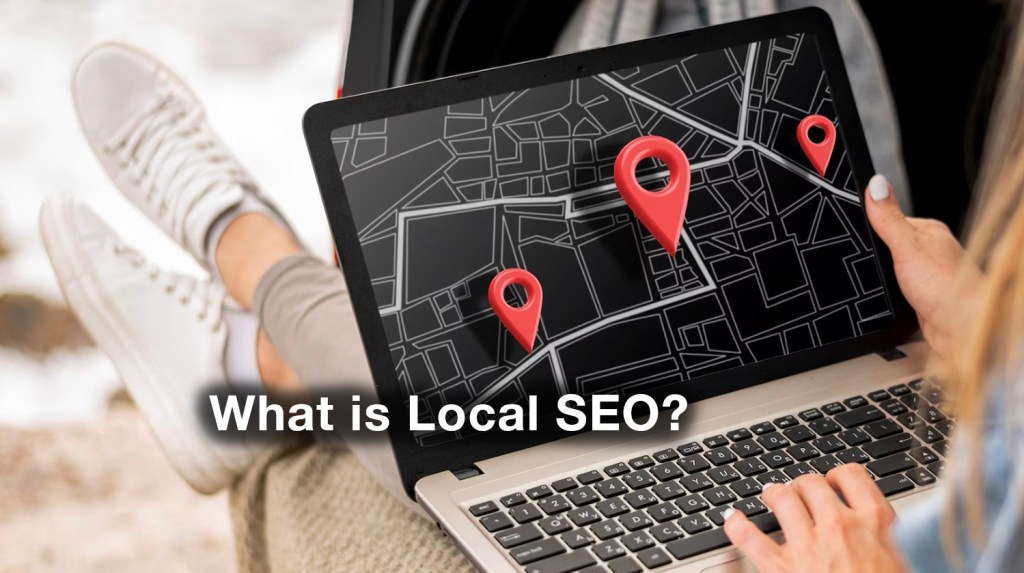Updated: Jan 02, 2024 By: Dessign Team

Local SEO is a digital marketing strategy that helps businesses improve their online visibility for local searches on search engines like Google. It involves optimizing a website and its content to rank higher in local search results for specific keywords and phrases related to the business's location and services. Local SEO is especially crucial for businesses with physical locations or those that serve a specific geographic area.
To understand local SEO, it's essential to know how search engines work. When a user searches for a specific query, the search engine crawls through its database of websites to find the most relevant results. For local searches, the search engine considers the user's location and shows results that are geographically relevant. This is why local SEO is crucial for businesses that want to attract customers in their area.
Local SEO involves several strategies, such as optimizing a business's Google My Business profile, building local citations, and leveraging customer reviews and ratings. It also involves using local SEO tools and analytics to track and measure the effectiveness of the strategy. By implementing local SEO best practices, businesses can increase their online visibility, attract more local customers, and ultimately grow their revenue.
Key Takeaways
- Local SEO is a digital marketing strategy that helps businesses improve their online visibility for local searches on search engines like Google.
- It involves optimizing a website and its content to rank higher in local search results for specific keywords and phrases related to the business's location and services.
- Local SEO strategies include optimizing Google My Business profile, building local citations, leveraging customer reviews and ratings, and using local SEO tools and analytics.
Understanding Local SEO
The Basics of Local SEO
Local SEO is the process of optimizing a business's online presence to improve visibility and attract local customers. It involves optimizing a website and its content to rank higher in search engine results pages (SERPs) for local search queries. Local SEO is different from traditional SEO, as it focuses on location-based searches and is geared towards businesses that have a physical location or serve a specific geographic area.
Importance of Local SEO
Local SEO is important because it helps businesses attract potential customers who are searching for products or services in their local area. According to Google, 46% of all searches have a local intent, meaning that people are actively looking for businesses in their area. By optimizing their online presence for local search, businesses can improve their visibility and attract more local customers.
Local SEO Vs Organic SEO
While both local SEO and organic SEO share some similarities, they are different in their approach and goals. Organic SEO focuses on improving a website's visibility in search engine results pages for relevant keywords, regardless of location. Local SEO, on the other hand, is focused on improving a business's visibility in local search results for a specific geographic area. Local SEO also takes into account factors such as proximity, relevance, and prominence, which are not as important in organic SEO.
Key Ranking Factors in Local SEO
There are several key ranking factors that can affect a business's visibility in local search results. These include:
- Relevance: how well a business's website and content match the search query and the user's intent.
- Proximity: how close a business is to the user's location or the location specified in the search query.
- Prominence: how well-known and authoritative a business is online, based on factors such as backlinks, reviews, and social media presence.
- Signals: various signals that indicate a business's relevance and authority, such as NAP (Name, Address, Phone number) consistency, website structure, and schema markup.
By optimizing for these key factors, businesses can improve their chances of ranking higher in local search results and attracting more local customers.
Local SEO Strategy
Local SEO strategy involves optimizing a business's web presence to increase visibility in local and localized organic search engine results. This section will cover the essential sub-sections of local SEO strategies that businesses can use to improve their online presence and attract more local customers.
Google My Business Optimization
Google My Business (GMB) is a free tool that businesses can use to manage their online presence across Google, including Search and Maps. Optimizing a business's GMB profile is a critical part of local SEO strategy. To optimize a GMB profile, businesses should:
- Claim and verify their business listing
- Ensure their business name, address, and phone number (NAP) are accurate and consistent across all online directories
- Add relevant business categories, products, and services
- Include high-quality photos and videos of their business
- Encourage customers to leave reviews
By optimizing their GMB profile, businesses can improve their visibility in Google's local search results and attract more local customers.
Keyword Research for Local SEO
Keyword research is the process of identifying the keywords and phrases that people use to search for products or services in a specific geographic area. For local SEO, businesses should focus on identifying local keywords that are relevant to their business and target audience. To conduct keyword research for local SEO, businesses should:
- Use keyword research tools to identify relevant local keywords
- Analyze competitor websites to identify relevant keywords they are targeting
- Consider the searcher's intent when selecting keywords
- Use long-tail keywords that are more specific to the business's products or services
By conducting keyword research for local SEO, businesses can optimize their website and content to target the keywords that their local audience is searching for.
On-Page SEO for Local Businesses
On-page SEO involves optimizing a website's pages and content to improve their visibility in search engine results. For local businesses, on-page SEO should focus on optimizing the website's pages and content for local searchers. To optimize a website's on-page SEO for local search, businesses should:
- Include the business's NAP on every page of the website
- Use local keywords in the website's content and meta tags
- Create location-specific pages for each business location
- Optimize the website's images with alt tags and file names that include local keywords
- Use schema markup to provide search engines with additional information about the business's location and services
By optimizing a website's on-page SEO for local search, businesses can improve their visibility in local search results and attract more local customers.
Building Local Citations
A citation is any online mention of a business's name, address, and phone number (NAP). Building local citations is an essential part of local SEO strategy. To build local citations, businesses should:
- Ensure their business's NAP is accurate and consistent across all online directories
- Identify and claim their business listings on relevant online directories
- Encourage customers to leave reviews on online directories
- Monitor and update their business listings regularly to ensure accuracy and consistency
By building local citations, businesses can improve their visibility in local search results and attract more local customers.
Link Building for Local SEO
Link building is the process of acquiring backlinks or inbound links from other websites to a business's website. Link building is an essential part of SEO strategy, including local SEO. To build links for local SEO, businesses should:
- Identify and reach out to local websites and blogs that are relevant to their business
- Create high-quality content that is shareable and link-worthy
- Encourage customers and partners to link to their website
- Monitor their backlink profile regularly to ensure quality and relevance
By building links for local SEO, businesses can improve their website's authority and visibility in local search results.
Local SEO Tools and Analytics
Tools for Local SEO
Local SEO requires the use of specialized tools to help businesses optimize their web presence for local search. These tools can help businesses track their rankings, manage their online reputation, and analyze their website's performance. Here are some of the most popular tools used in Local SEO:
- Google My Business: This free tool allows businesses to manage their online presence across Google, including Google Maps and Google Search. It is an essential tool for local businesses looking to improve their visibility in local search results.
- Google Search Console: This free tool helps businesses monitor their website's performance in Google search results. It provides insights into how Google crawls and indexes a website, as well as any errors or issues that may be affecting its performance.
- Rank Tracker: This tool helps businesses track their website's rankings in search engine results pages (SERPs) for specific keywords. It allows businesses to monitor their progress over time and identify areas for improvement.
- BrightLocal: This tool provides businesses with a suite of local SEO tools, including a local rank tracker, citation tracker, and review monitoring tool. It helps businesses improve their local search visibility and manage their online reputation.
Using Analytics in Local SEO
Analytics play a crucial role in Local SEO, providing businesses with valuable insights into their website's performance and user behavior. By analyzing this data, businesses can identify areas for improvement and optimize their website for better local search rankings. Here are some of the ways analytics can be used in Local SEO:
- Keyword Analysis: Analytics can help businesses identify the keywords that are driving traffic to their website. By analyzing this data, businesses can optimize their content for these keywords and improve their visibility in local search results.
- User Behavior Analysis: Analytics can provide businesses with insights into how users interact with their websites. By analyzing this data, businesses can identify areas where users are dropping off and optimize their websites to improve user engagement.
- Conversion Tracking: Analytics can help businesses track their website's conversion rates, allowing them to identify areas where they can improve their website's performance and increase conversions.
Overall, Local SEO tools and analytics are essential for businesses looking to improve their visibility in local search results. By using these tools and analyzing their website's performance, businesses can optimize their web presence for better local search rankings and attract more customers to their physical location.
Leveraging Reviews and Ratings
Importance of Reviews and Ratings
Reviews and ratings are crucial components of local SEO. They provide valuable insights into the quality of services offered by a business and help potential customers make informed decisions. Positive reviews and high ratings can significantly improve a business's online reputation and visibility, while negative reviews and low ratings can have the opposite effect.
According to a study by BrightLocal, 91% of consumers read online reviews before visiting a business, and 84% trust online reviews as much as personal recommendations. This highlights the importance of reviews and ratings in shaping consumer behavior and influencing purchasing decisions.
In addition to their impact on consumer behavior, reviews and ratings also play a significant role in search engine algorithms. Google, for example, considers the quality and quantity of reviews and ratings when ranking businesses in local search results. Therefore, businesses that actively manage their online reputation and encourage customers to leave reviews and ratings are more likely to rank higher in search results and attract more customers.
Managing Your Online Reputation
Managing your online reputation involves actively monitoring and responding to reviews and ratings, both positive and negative. This helps to establish trust and credibility with customers and shows that you value their feedback and are committed to providing quality services.
Here are some tips for managing your online reputation:
- Respond promptly to all reviews, thanking customers for positive feedback and addressing any concerns or issues raised in negative reviews.
- Encourage customers to leave reviews and ratings by including links to review sites on your website and social media profiles, and by offering incentives such as discounts or freebies.
- Monitor your online presence regularly to ensure that all information about your business is accurate and up-to-date.
- Use customer feedback to improve your services and address any areas of weakness or dissatisfaction.
- Consider using reputation management tools and services to automate the process of monitoring and responding to reviews and ratings.
By leveraging reviews and ratings effectively, businesses can improve their online reputation, attract more customers, and enhance their overall local SEO strategy.
Local SEO for Different Business Models
Local SEO strategies can vary depending on the type of business model. Here are some tips for optimizing local SEO for different business models.
Local SEO for Service Area Businesses
Service area businesses, such as plumbers or electricians, typically serve a specific geographic area. To optimize local SEO for service area businesses, consider the following:
- Create a Google My Business profile and make sure to list the service areas you cover.
- Optimize your website content with location-specific keywords, such as “plumber in [city name].”
- Encourage customer reviews on your Google My Business profile to improve your local rankings.
- Use local business directories, such as Yelp or Angie's List, to increase your online visibility.
Local SEO for Enterprises
Enterprises with multiple locations face unique challenges when it comes to local SEO. To optimize local SEO for enterprises, consider the following:
- Develop a consistent naming convention for all locations and ensure that all listings have accurate and up-to-date information.
- Create location-specific landing pages on your website to target local keywords and improve local rankings.
- Use schema markup to ensure that search engines can easily identify and display information about your different locations.
- Implement a review management strategy to monitor and respond to customer reviews across all locations.
By tailoring your local SEO strategy to your specific business model, you can improve your online visibility and attract more local customers.
Advanced Local SEO Tips
To take your local SEO to the next level, there are some advanced tips you can follow. These tips are designed to help you optimize your website and online presence to rank higher in local search results and attract more local customers.
One of the most important advanced local SEO tips is to focus on localizing your content. This means creating high-quality content that is relevant to your local audience and optimized for local keywords. You can also create location pages on your website to target specific local areas and improve your map pack rankings.
Another important tip is to ensure that your website is mobile-friendly. With more and more people using their mobile devices to search for local businesses, having a mobile-friendly website is essential for ranking well in local search results.
In addition, you should also focus on optimizing your Google My Business profile. This includes regularly posting updates and using Google Posts to promote your business. You should also encourage your customers to leave business reviews, as this can help improve your local search marketing efforts.
Competitor analysis is another important aspect of advanced local SEO. By analyzing your competitors' online presence and SEO metrics, you can identify opportunities to improve your own local SEO strategy and gain a competitive edge.
Finally, it's important to stay up-to-date on the latest local SEO tips and resources. This includes attending local SEO conferences, reading industry blogs and publications, and following local SEO experts on social media.
By following these advanced local SEO tips, you can improve your local search rankings, attract more local customers, and grow your business.
Frequently Asked Questions
How does local SEO work?
Local SEO is the process of optimizing a website to rank higher in local search results. This is done by optimizing the website's content, metadata, and other technical elements to make them more relevant to local search queries. Local SEO also involves optimizing the website for local search platforms such as Google My Business, Yelp, and Bing Places.
What are the best local SEO techniques?
Some of the best local SEO techniques include optimizing the website's content with local keywords, building local backlinks, optimizing the website's metadata with local information, and creating a Google My Business page. Additionally, creating local content and engaging with local customers on social media can also help improve local SEO.
What are the most important local SEO platforms?
The most important local SEO platforms include Google My Business, Bing Places, Yelp, and Facebook. These platforms allow businesses to create a local online presence, manage their online reputation, and engage with local customers.
What are some effective local SEO tips for small businesses?
Some effective local SEO tips for small businesses include optimizing the website's content with local keywords, creating a Google My Business page, building local backlinks, and engaging with local customers on social media. Additionally, creating local content and optimizing the website's metadata with local information can also help improve local SEO.
What are the most valuable local SEO keywords?
The most valuable local SEO keywords are those that are relevant to the business and the local area. For example, if a business is located in New York City and sells pizza, valuable local SEO keywords might include “pizza delivery NYC,” “best pizza in NYC,” and “NYC pizza restaurant.”
How much does local SEO typically cost?
The cost of local SEO can vary depending on the size of the business, the scope of the project, and the level of competition in the local market. However, local SEO typically costs between $500 and $5,000 per month.



